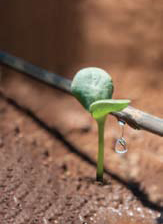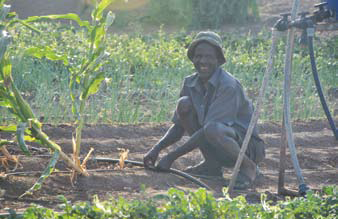By Issabella Wanjiru
 Drip irrigation is a type of micro-irrigation that has the potential to save water and nutrients by allowing water to drip slowly to the roots of plants, either from above the soil surface or buried below the surface. Drip irrigation systems distribute water through a network of valves, pipes, tubing and emitters. With the drip of an emitter, precise amounts of water are delivered directly to the plants, rootzone. Drip irrigation gives farmers much more control over where water is distributed and where it is not distributed, allowing you to use only the exact amount of water needed for each plant.
Drip irrigation is a type of micro-irrigation that has the potential to save water and nutrients by allowing water to drip slowly to the roots of plants, either from above the soil surface or buried below the surface. Drip irrigation systems distribute water through a network of valves, pipes, tubing and emitters. With the drip of an emitter, precise amounts of water are delivered directly to the plants, rootzone. Drip irrigation gives farmers much more control over where water is distributed and where it is not distributed, allowing you to use only the exact amount of water needed for each plant.
Recently Kenya experienced one of the driest seasons, and with major drought gripping various parts of the country, farmers needed reliable methods to conserve water and on the same breadth produce high quality crops. Amiran Kenya as an agricultural company with years of experience providing solutions to farmers, has answers to water shortage issues. Shay Nir Amiran’s Head of Green house and Irrigation department avers that, efficient irrigation is essential for water-wise farming. Flood, furrow, sprinkler and drip irrigation are the most common watering techniques, but the first three are notoriously inefficient. With flood or furrow irrigation, most water and nutrients moves down through the soil past the roots. Sprinkler water can evaporate or can be simply blown away, by wind, wetting leaves thus making them more susceptible to diseases.
In contrast, drip irrigation slowly delivers water to plant roots. The root zone remains moist but rarely waterlogged, creating a balance of water,oxygen and nutrients around roots for optimum growth. It also reduces root stress from flooding and drying cycles. Shay Nir states that drip irrigation can save up to 70 percent of applied water compared with a sprinkler system. Weeds are also reduced since water targets the root zone rather than aisles between rows. In addition, given that nutrients concentrate where water is, drip will help conserve nutrients because the root zone retains more water than with other irrigation systems. He also saysthat, to conserve more water,farmers’should cover drip lines and areas around plants with mulch such as Amiran’s plastic mulch. Plastic Mulches help conserve moisture by reducing evaporation. The types of plastic mulch available at Amiran are black\ white mulch and silver\black mulch.
 Mulch has other advantages, such as controlling annual weeds. Mulch shades soil and prevents weeds from germinating, but removes all weed seed from mulch before applying it. In colder regions, black plastic mulch also helps to warm the soil.Most organic mulches tend to slowly decompose where they touch soil, releasing nutrients for plants. Mulches also control temperatures by adjusting light, heat conditions and providing the optimal root zone temperature.
Mulch has other advantages, such as controlling annual weeds. Mulch shades soil and prevents weeds from germinating, but removes all weed seed from mulch before applying it. In colder regions, black plastic mulch also helps to warm the soil.Most organic mulches tend to slowly decompose where they touch soil, releasing nutrients for plants. Mulches also control temperatures by adjusting light, heat conditions and providing the optimal root zone temperature.
Combing drip irrigation technologies and plastic mulch is quite beneficial to farmers as they strive to conserve water during the dry periods that continue to be felt in most parts of the country. Amiran Kenya has a variety of driplines such as; drip net PC 12150, stream line 16100, Aries 16250, Netafim integral non-compensated dripper etc.
In conclusion Shay Nir adds that Amiran has water reservoirs such as Kentanks, polytanks of various capacities and dam liners of 1mm and 0.5mm, which are good for water storage. All these items are available at Amiran Kenya headquarters at Embakasi.
